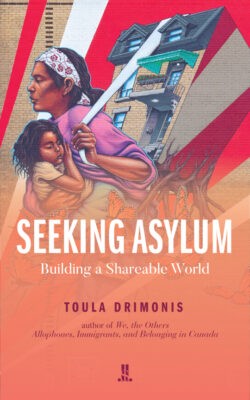It’s been just over a year since Prime Minister Justin Trudeau and US President Joe Biden teamed up to announce the closure of Roxham Road, an unofficial border crossing in the small village of Hemmingford, Quebec. Thousands of asylum seekers had been relying on Roxham Road each month to ensure their refugee claims found consideration in Canada. With this announced amendment, the Safe Third Country Agreement now blankets the entirety of the shared border, making it so that anyone who lands in the US first must stay there, even if they risk deportation. The decision was in response to much complaining, consternation and assumption-making regarding the very individuals and families who simply wanted the ability to claim asylum in Canada.

Seeking Asylum
Building a Shareable World
Toula Drimonis
Linda Leith Publishing
$21.95
paper
158pp
9781773901527
Built on the foundation of Drimonis’ work as columnist for Cult Montreal, Ricochet, and the National Observer, the book weaves adapted versions of columns in with new work. Each of the chapters provides elements of an overall argument that emphasizes the need to offer immigrants and asylum seekers opportunity rather than to deny possibilities that are positive for all. Drimonis challenges notions of exceptionalism and asks instead for the recognition of each other’s humanity.
Throughout, she vacillates between discussions of Canada and the United States, crossing the border back and forth, comparing and contrasting approaches to migration. The book pushes back against common perceptions – providing strong research to counter fallacies such as refugees and immigrants contributing to higher crime rates or being a burden on the economy. Drimonis provides helpful definitions, developing her arguments with painstaking use of both journalistic and academic sourcing.
She also reaches to the past for examples: in Chapter Four, for instance, she discusses the origins of the term “asylum” and the long history of fleeing persecution as a result of war, enslavement, crime, and other reasons. Even though today’s asylum claimants may be, as she underlines, escaping gender-based violence or climate change, we should witness the ongoing need to recognize immigration and asylum seeking as a constant, rather than something that can – or must – be curbed.
In a somewhat self-deprecating manner, Drimonis mentions how she is not a “geo-political expert,” but this positioning only highlights the work she does to answer questions and provide examples and evidence throughout the book. There are, unfortunately, a few distracting issues with copyediting, repetition, and consistency; if this book is as popular as her last one, here’s hoping that some of these small issues can be ironed out in future printings.
Building throughout the work what she refers to as a “case for compassion,” Drimonis’ book convincingly demonstrates that there is a need to consider choices and that more could be achieved to support more people. She emphasizes how institutions and governments could actually help more, but are making a choice not to. A juxtaposition of the words of Pope Francis, demanding we all “stop passing off the issue of migration to others,” with the reality of the billions of dollars of Vatican assets that could be used to address the problem is quite convincing as an object lesson.
Drimonis will often describe a local event or reality and then expand to encapsulate a wider concept. It’s an effective method, especially when it encourages the questioning of assumptions here in Montreal and demonstrates the need to reach across borders and boundaries rather than create new ones.mRb






0 Comments